Paragraph 1: The Demolition and Its Immediate Impact
On Wednesday, August 27, 2025, the Ministry of Public Works (MPW) in Liberia carried out a demolition exercise in the 540 London Community of Oldest Congo Town, leaving scores of squatters homeless. The operation, involving the MPW’s heavy machinery, caught residents, many of whom were elderly women, off guard. Their homes were destroyed, belongings strewn across the ground, leaving many without shelter. The suddenness of the demolition and the lack of prior arrangements for relocation amplified the residents’ distress and vulnerability. The event sparked outrage and accusations of forceful and untimely eviction without proper compensation.
Paragraph 2: Residents’ Pleas and Accusations
The affected residents voiced their anguish and frustration, questioning the government’s actions. While acknowledging the need for development, they criticized the lack of adequate notice and the absence of compensation. Norris Walker, an elderly resident, poignantly expressed her despair at having her only shelter destroyed, leaving her with nowhere to go, given her age and ill health. Another resident, Julious Wedor, accused the Liberian government of mistreatment, citing a purported squatter agreement that allowed residents to occupy the land until the government was ready to develop it, with the promise of compensation. He argued that the one-week notice given before the demolition was insufficient and violated the agreement.
Paragraph 3: The Squatter Agreement and Broken Promises
Wedor’s claims about the squatter agreement highlighted the residents’ belief that they had a legal right to occupy the land. He asserted that the agreement, dating back to the previous administration of President George Weah, stipulated that residents would be compensated before any eviction took place. This understanding, according to Wedor, was reached through several meetings with government representatives. The demolition, therefore, was perceived not only as a displacement but also as a breach of trust and a broken promise by the government. The residents felt betrayed by the very entity that was supposed to protect their welfare.
Paragraph 4: Hardship and Economic Vulnerability
The demolition exacerbated the already precarious living conditions of the residents. Many were struggling with economic hardship, and the sudden loss of their homes deepened their vulnerability. Sonnie Johnson, another affected resident, lamented the loss of her meager savings, which were intended for food, now used to salvage what she could from the rubble. The demolition thrust these individuals into further hardship, leaving them without shelter, possessions, and the means to secure basic necessities. Their pleas for an extension to find alternative arrangements went unheeded.
Paragraph 5: A Wider Pattern of Displacement and the Government’s Response
The demolition in the 540 London Community was not an isolated incident. The construction of the Boulevard Overhead Bridge had already resulted in similar demolitions in other communities, including the SKD Community in Paynesville. This pattern of displacement underscored the human cost of development projects and raised concerns about the government’s approach to addressing the needs of affected communities. While authorities maintained that the demolitions were necessary for development, their justifications failed to address the immediate and long-term needs of the displaced residents.
Paragraph 6: Conflicting Narratives and the Justification for Demolition
The government’s narrative contradicted the residents’ claims. An official from the Ministry of Public Works refuted the existence of a compensation agreement, arguing that compensation was not provided for structures built on government land or roadways. The official maintained that the residents had received sufficient notice, spanning several years, and that development could not be halted based on “sympathies.” This stark contrast in narratives highlighted the power imbalance between the government and the displaced residents. The government prioritized the development agenda, while the residents struggled to have their voices heard and their rights recognized. The conflicting accounts emphasized the need for transparency and accountability in development projects, especially concerning the treatment of vulnerable populations.














